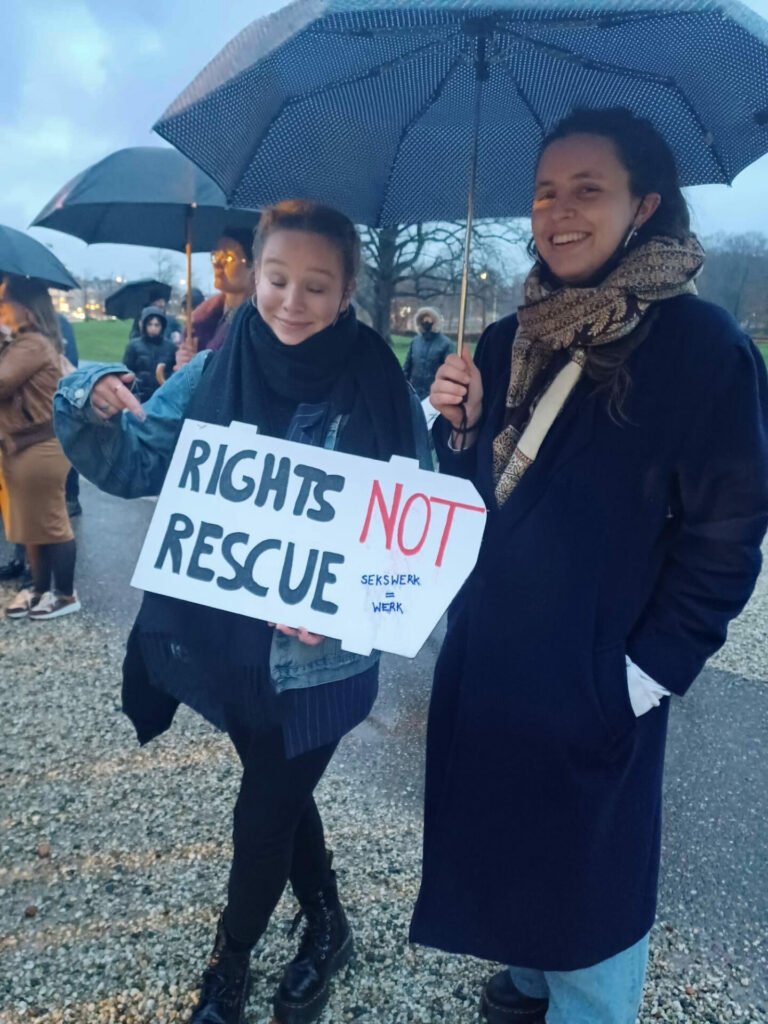Stephanie Eveline Waal: “It is time that we respect, support and protect sex workers”

On February 14th some 40 people protested in The Hague in solidarity with sex workers and especially trans sex workers of color. It was cold and it continually rained, but the atmosphere was energetic and warm. The soup made by members of the Haagse Stads Partij (HSP) certainly helped. There were some very strong speeches. Here’s the one by Stephanie Eveline Waal.
“Sex sells.” I’m sure that most of us are familiar with this phrase. And honestly, there is truth to it: whether it is music videos or commercials, Magic Mike or “50 Shades of Gray” – sex does, indeed, sell.
For a long time, it was men who capitalized on the sex that was disproportionally provided by women. I’m talking about female artists who were expected to be sexy in their videos and shoots, strippers in male artists’ music videos, Pin-up models, Playboy bunnies – rarely were the men capitalizing on these women’s work shamed for doing so. The women leveraging their sexuality for money, though? They were frequently slut-shamed, degraded, and dehumanized.
This already alludes to a certain hypocrisy: sex is widely sold and consumed, but the people providing the sex are treated as valueless and unworthy of respect beyond our consumption, in particular when they are women, genderqueer and/or People of Color.
Dit bericht op Instagram bekijken
This hypocrisy becomes particularly evident when people do not use sex to sell another product, but sell sex as the product itself. AKA: sex work. In case of sex work, people cling onto a language of morality and faux-concern in a way that you rarely, if ever, hear in reference to other forms of labor. How often have you heard people say that sex workers “sell their bodies”? Often?
Okay, now: how often have you heard people say that construction workers, dance instructors, or massage therapists “sell their bodies”? (either rarely or never, I bet). In that case people would say: “They don’t sell their bodies; they sell construction work; dancing classes; massages!” Okay, sure. But in that case, sex workers don’t sell their bodies, either. They sell sex. Like a dance instructor, they sell a product. Like a massage therapist, they sell a service. Like a construction worker, they sell their physical labor. Like any other laborer, they sell their time and energy.

People don’t see it that way, though, because they don’t actually see sex work as work. They don’t see sex (work) as a service or product. They marginalize sex workers because of their supposed moral objections to it. But I have got to ask: where were these moral objections when, in 2019, the Netherlands ranked 14th worldwide for traffic to Pornhub, despite ranking 67th in terms of world population? How is it that sex work is so widely consumed in our society, yet sex workers are consistently pushed to its margins?
People will bring up the horrid forms of abuse, degradation, and exploitation that can be found in the sector of sex work. I will not deny these realities. Rather, I will say this: pushing sex workers to the margins of our society, despite massively consuming their work, despite our municipalities making money of the taxes they pay, and despite the red-light district attracting tourism that ultimately stimulates our economy, is not just hypocritical – it is exploitative in its own way. Framing sex workers as immoral, as lacking self-respect, or as inherently lacking agency, is degrading in its own way. And the constant stigmatization of sex workers won’t actually resolve any of these issues, but will only deepen the unsafety and risk of abuse and violence that they are already exposed to.
I won’t deny these realities, because these realities are why we are standing here, today. People would rather use these problematic realities to stigmatize sex work, than actually resolve them. So, these problems persist – and the stigmatization only worsens them. We are standing here today to demand equal respect, legal recognition, and labor protections for sex workers. Because without these demands being met, sex workers will continue to be disproportionally vulnerable to (deadly) violence and abuse.
Let me make this abundantly clear: sex workers are NOT the problem, nor is sex work itself. The lack of safety, the abuse, the degrading and exploitative practices, those are the problems. And stigmatizing and marginalizing sex work will do absolutely NOTHING to fix these problems. Your “moral” objections and personal discomfort with sex work should never be reason for the voices and concerns of sex workers to go unheard, or for them and their labor to be pushed to the margins of society. If you actually care about sex workers, you listen to them, you amplify their voices, and you stop acting based on the assumption that you know better than them what they need.
Your discomfort should never, ever impact the safety and circumstances under which sex workers carry out their labor. Your discomfort does not make it any less true that SEX WORK IS WORK. Let me repeat that: SEX. WORK. IS. WORK. And it is time that we recognize it as such.
It is time that sex work is treated as equal to any other form of work. It is time that sex workers enjoy the same benefits and labor protections in return for the taxes they pay, as other workers do. That sex workers get the same social security net as other workers. That we normalize and destigmatize sex work, so that when sex workers may find themselves in dangerous, exploitative, or violent situations, they can ask and count on our help. Moreover, as we stand here today, let’s make a promise that sex workers can count on our tireless efforts to prevent them ever having to face such danger, exploitation, or violence, in the first place.
We need to use our voice, vote, and coin after this protest. Use your voice to speak up when you hear or see rhetoric about sex workers that is stigmatizing and harmful to them. See which parties seek to empower and protect sex workers, and use your vote accordingly. And when you consume sex work, use your coin, and pay sex workers for their f*cking labor.
It is time that we respect sex workers, support sex workers, and protect sex workers. And if you can’t do this, stop consuming sex work, and GET OUT THE WAY. Because you are posing an obstacle to their safety and wellbeing; and that needs to stop.
Stephanie Eveline Waal
(Stephanie Eveline Waal is a candidate for councilmember for the HSP (no. 15 on the list) in the upcoming elections)

 (@evelinejuly)
(@evelinejuly)